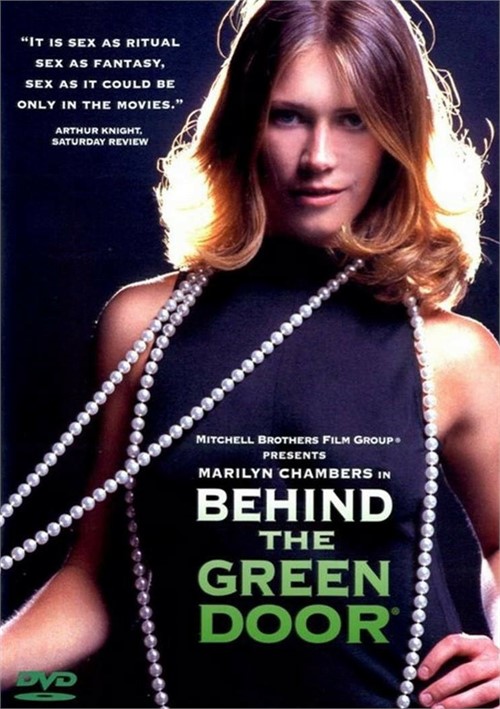Released in 1972, Behind the Green Door is one of the earliest feature-length pornographic films. It’s discussed at some length by Linda Williams in Hard Core, and I’ve discussed it myself in “Does Pornography Presuppose Rape Myths?” The reason it was of interest to me there is that, more so than any of the other ‘classics’ of the early 1970s, it arguably fits the generalizations that people like Catharine MacKinnon and Rae Langton like to make about pornography.
The basic story is this. Two truckers turn up at a diner, and the cook asks them to tell the story of the ‘green door’. The two of them seem to have been on vacation somewhere, and to have gone to a very private sex club. Meanwhile, Gloria (played by Marilyn Chambers), who just happens to be staying at the same hotel, is kidnapped by a group of men and taken to said club. She’s met by a woman who ‘ministers’ to her—massaging her and helping her to relax—and who tells her that, some years before, the same thing had happened to her, and that she is about to experience the most ‘exquisite’ moment of her life.

An announcement is made to the audience that they are about to witness the ‘ravishment’ of a young woman, who, they are assured, will not be harmed. Gloria is then led by six women through the eponymous green door abd onto a small stage. They begin to ‘ravish’ her: stroking her body, kissing her breasts, and going down on her. After a while, a Black man is pseudo-African garb comes out and goes down on her as well, and so forth. Eventually, an orgy breaks out, and when there is a break, one of the truckers puts Gloria over his shoulder and runs out with her.
The story cuts back to the diner, where the other guy says, “And I never saw her again”. The cook asks the would-be rescuer what happened, and he says he’ll tell him some other time. As he drives down the road, we see him having gentle, loving sex with Gloria.
It’s easy to see why Williams regards Green Door as misogynistic. It certainly looks as if the film indulges in dangerous rape myths. Gloria is initially resistant, but after a while she seems to be participating enthusiastically.
Darren Kerr has argued for a more progressive reading of Green Door. I need to re-read that paper before I say any more about it, but I have wondered myself whether there are other ways to read the film. Just how seriously are we to take the truckers’ story, even within the context of the film? Is what we see at the end supposed to be a memory, or is it a fantasy?
It’s worth remembering here that many women, even many feminist women, have fantasies of being abducted or over-powered. I have read, somewhere, that Chambers was initially reluctant to perform in such a movie, but that she herself found the fantasy interesting. I tend to think that pornography, as a genre, often traffics in fantasy, and that failure to recognize this fact has led many authors to misread it.
I honestly don’t know whether Green Door is fantasy, in this sense, as opposed to just being fiction. And I don’t propose to try to explain here exactly what the difference amounts to (though see this paper, which is still very much in progress as of this writing). But one way to think of it is that fantasy is, as Luca Ferrero once put it in discussion, ‘doubly sandboxed’. (This term may come from elsewhere.) Meaning: We’re expected neither to respond to the story in the same sort of way we would antecedently have responded to a real-world analogue nor to export those responses to the real-world, thus changing how we respond in future to real-world analogues.
To be sure, that such fantasies are as prevalent as they are has something to do with the way in which sex, and especially heterosex, is understood in our culture. But it would obviously be fallacious to assume that, just because the fantasies are caused by unjust social circumstances, they reinforce or help to perpetuate those circumstances, even a little bit.
Even waiving that, I’m not at all sure we’re meant to regard Gloria’s ‘ravishment’ as the ‘exquisite’ experience she was promised it would be. The trucker certainly seems to be rescuing her, and that would make very little sense if everything was well. Granted, casting the trucker in the role of savior—a man comes to the rescue yet again—is not ideal. But that he’s a trucker, whereas the sex club seems like much more of an upper-class place, also seems relevant here.
None of that is to say that Green Door is a great, or even decent, film (though it is historically important). There may not be a fully coherent way to read it. Moreover, the photography is generally quite poor, and the story, such as it is, really does very little for me, even as a fantasy. The sex is so chaotic, especially once the orgy starts, that I have a difficult time engaging with it, let alone empathizing with any of the characters. It’s more like watching a train wreck.
The film is available from Gamelink. Unfortunately, the digital transfer seems to have been done from a print that has sustained significant damage in places.

Leave a Reply